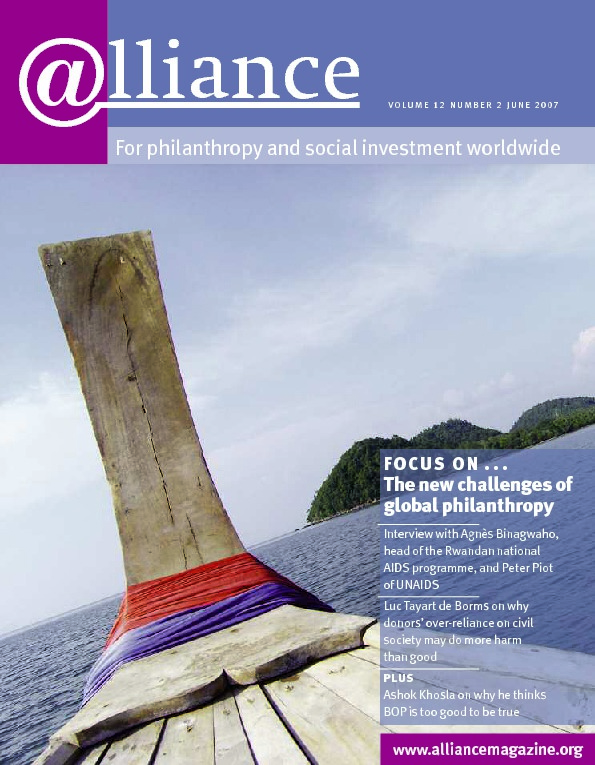International philanthropy is growing rapidly in both Europe and the US, along with other forms of cross-border cooperation. Both new and experienced international funders are increasingly looking for guidance on how to ensure that their international philanthropy is conducted in an accountable, transparent and responsible manner.
Although accountability has been a key issue for foundations on both sides of the Atlantic,[1] until now most of the attention has been paid to strengthening foundations’ overall governance and practice within their national borders. The Principles of Accountability for International Philanthropy are a first attempt to draw up guidelines specifically for international donors.
Recognizing that the international context differs in significant respects from philanthropy in one’s own country, the Council on Foundations and the European Foundation Centre (EFC) undertook a joint project in 2005 to look specifically at accountability for philanthropy that crosses international borders. Drawing on their experience with the earlier joint Disaster Response Initiative, which resulted in a set of principles and practical guidelines to assist independent funders in responding to disasters in a more effective and accountable manner, the two organizations felt that cooperation on this issue would produce a response which better reflected the diversity of the sector and the variety of approaches to philanthropy.
Aspirational and practical
A 14-member Joint Working Group was formed in early 2005, comprising foundations of different types, sizes, programmatic interests, philanthropic styles and traditions. The objective was to produce a handy educational resource for foundations – an inspirational and aspirational document that also provides some practical suggestions for implementing its principles.
As Patricia L Rosenfield of the Carnegie Scholars Program and a Working Group member put it: ‘The Principles are aspirational but also practical. They provide a guide for developing relationships and grants based on openness and respect between donors in one country and grantees in another. From my own experiences, these principles articulate a perspective that has not been well documented or presented. Indeed, we all need to take stock of how we have been doing our work.’
Dealing with diversity
The diversity of the group represented one of the key challenges of the whole process; at the same time it proved to be a very rich learning experience. As Luc Tayart de Borms, Co-Chair of the Working Group, points out, ‘The need to translate particular national accountability challenges into general principles was a first important step.’
In addition, it became apparent at the first meeting that terms like ‘accountability’ and ‘philanthropy’ can carry different meanings, even for native English speakers, and do not always translate well into other languages and cultures. After much discussion, the group agreed to define accountability for international philanthropy as a commitment to uphold your core mission, serve the public good, engage and inform your stakeholders, and assure positive impact.
Deciding what to cover
Another key question was what the Principles should cover and how they would differ from existing standard-setting initiatives. The Working Group came to two conclusions early in its deliberations. First, legal compliance, fiduciary responsibility and administrative oversight, while essential elements of accountability in cross-border philanthropy as in domestic giving, are ‘givens’ and should not be the focus here. Second, accountability towards philanthropic grantees and partners is the area that is least understood and most in need of elaboration, requiring outreach and serious discussion with a representative sample of those groups.
These choices are reflected clearly in the seven principles put forward by the group: integrity, understanding, respect, responsiveness, fairness; cooperation and collaboration; and effectiveness. These are underpinned by a set of good practice options which illustrate approaches that funders may choose to adopt in implementing the Principles. The Group was also concerned to ensure that, in view of the great diversity of the sector, the Principles and suggested good practice options speak to different types of funder. It is crucial, as Luc Tayart says, to recognize that ‘not every funder works exclusively with grantees. Others also engage in more operational ways and through partnerships in international activities.’
The consultation process
The Joint Working Group met four times over two years in Brussels, Washington DC, Cape Town and Geneva, and a series of consultations was held between spring 2005 and late 2006. The EFC conducted extensive consultations with its members, committees, National Associations of Donors, the Grantmakers East Group and Brussels-based NGOs, while the Council on Foundations undertook a similar exercise which included its members, International Committee, Grantmakers Without Borders, and the Africa Grantmakers Affinity Group. Joint consultations were held with CIVICUS and WINGS. Packed sessions were also held at both the Council’s and the EFC’s 2006 annual meetings, at which early drafts of the Principles document were critiqued.
In addition, Boris Cornejo, a Working Group member from Ecuador, circulated a draft of the Principles through a network of Latin American NGOs, a number of which responded with helpful comments. And in February 2006, the Joint Working Group organized a three-day consultation with 25 African NGO leaders from nine countries in Cape Town, South Africa (see p51). Our partner was the Southern Africa-United States Centre for Leadership and Public Values at the University of Cape Town’s Graduate School of Business.
Former US Ambassador to South Africa (and former head of the Council on Foundations) James Joseph argued in his keynote address that accountability must go well beyond compliance-based ‘obedience to the enforceable’ to embrace a broader ethics-based ‘obedience to the unenforceable’, an idea which Working Group member Rien van Gendt described as ‘refreshing’. ‘It puts a moral obligation rather than a legal obligation on foundations to discuss, assess and decide upon them [the Principles]. It will be interesting,’ he said, ‘to monitor how many foundation boards put these accountability principles on the agenda of their board meetings.’
Two comments from Working Group members strikingly illustrate the effects of the African workshop on our deliberations. Kathleen Duncan, former Director General of the Lloyds TSB Foundation for England and Wales, described hearing the views expressed by the African delegates at the Cape Town consultation as ‘a revelation’ to her. ‘Their frustration so courteously expressed about the attitude of certain funders made a deep impression.’
Jennifer Anstone of the Firelight Foundation expressed a similar view. ‘The working group heard African NGOs directly and honestly describe donor practices that undermine local capacity and development,’ she said. ‘As donors, we have a collective responsibility to address these issues. The Principles of Accountability are an important step in this direction’.
Because of the candid and constructive discussions with the African participants, the Cape Town workshop inspired the Joint Working Group and sharpened our focus on the ethical dimensions of accountability for international philanthropy.
The Principles of Accountability for International Philanthropy were published in April 2007.
1 For instance, the EFC recently revised its Principles for Good Practice and the Council on Foundations augmented its Statement of Ethical Principles to include good stewardship principles specifically for family, corporate and independent foundations.
For more information
To download the Principles, free of charge, go to http://www.efc.be or http://www.cof.org. Also available in printed format.
Comments are welcome and may be submitted either to Rob Buchanan at buchr@cof.org or to Sevdalina Rukanova at s.rukanova@efc.be
Rob Buchanan is Director, International Programs, at the Council on Foundations. Email buchr@cof.org
Sevdalina Rukanova is responsible for international initiatives at the EFC. Email s.rukanova@efc.be
Cole Wilbur, Packard Foundation and Working Group member
How do you deal with an internal struggle in the non-profit you are supporting? What do you do when you hear rumours that the money you are providing is being misused? How do you deal with a community with two religions that may be in conflict? It is too easy to think that one understands people and their needs, and the challenges they face. Difficult issues like this can arise with international or domestic grantmaking, but different culture and different context – and the sheer distance – make them harder to deal with when funding internationally. I hope these Principles will help people think through how to deal with these difficult situations, and that each of us involved in international grantmaking will find something in them that will make us more enthusiastic about improving our accountability.
Nicholas Borsinger, ProVictimis Foundation and Working Group member
When you think about it, those to whom we are possibly most accountable are not our grantees or their beneficiaries, or our partners, or our foundation boards, but those who are excluded from our grants. Given limited foundation resources and the almost unlimited needs of the planet, if you allocate €1 million to one issue, they are no longer available to another issue. Anyone who isn’t included is excluded.
The word ‘exclusion’ is one that should get all alarm bells ringing in philanthropy. We should be able to say, without quivering, to those publics that we actively exclude from our fields of intervention: ‘Your anger or frustration at being excluded from my area of intervention is infinitely legitimate, but I stand by both the difficult choices made and the effectiveness of my allocation of resources.’ In other words, we need to regularly make sure that our priorities are right.



Comments (0)